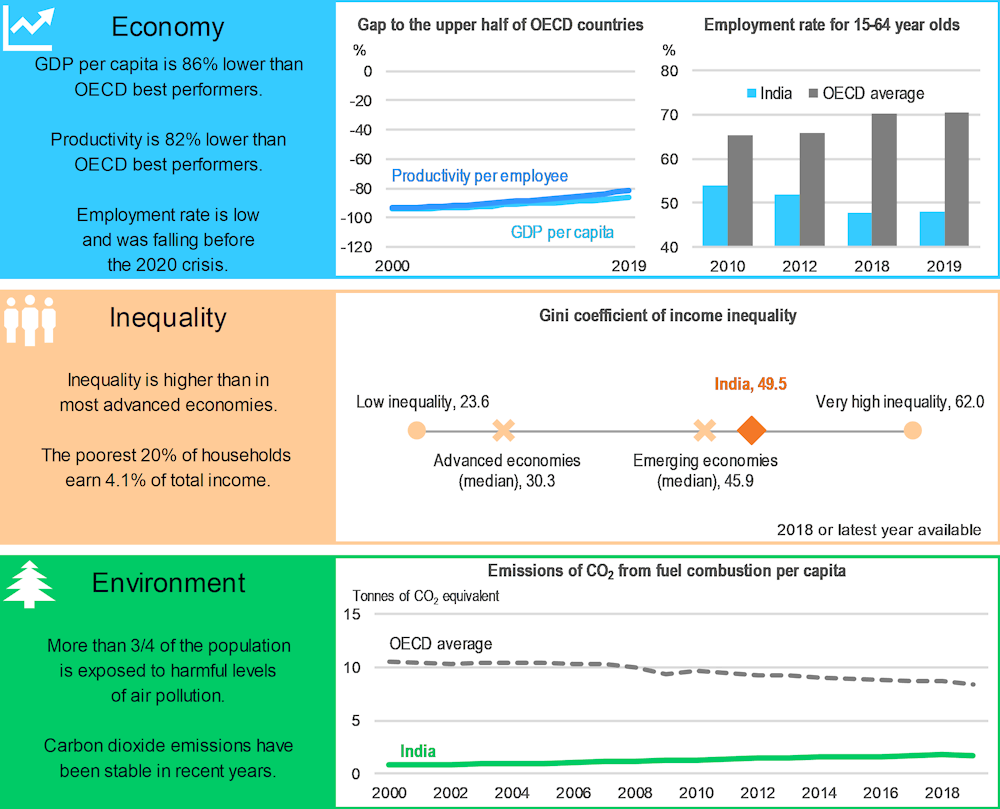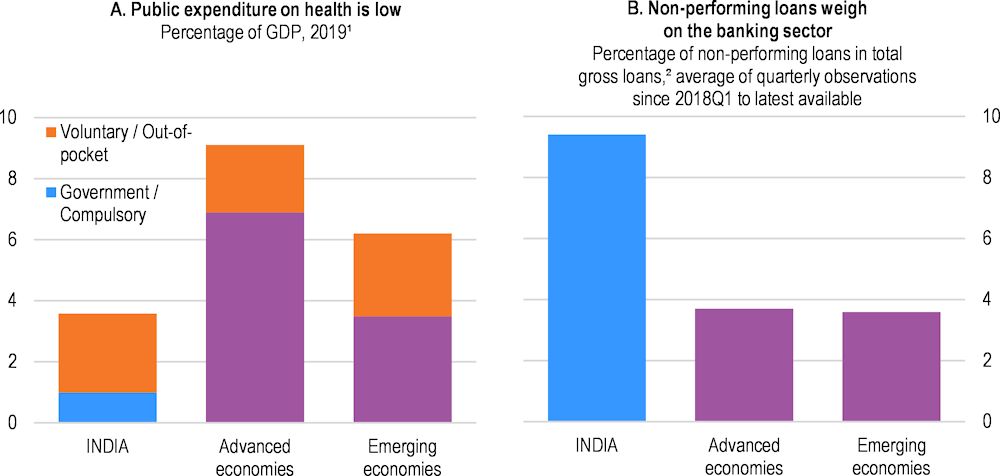Hitting particularly hard the informal sector, where much of the Indian population works, the pandemic reinforced the need for creation of jobs in the formal sector and reforms of health care, protection of vulnerable individuals, households and groups.
Economic Policy Reforms 2021

India
India: Performance prior to the COVID-19 crisis

Economy: Percentage gap with respect to the population-weighted average of the highest 18 OECD countries in terms of GDP per capita (in constant 2015 PPPs).
Inequality: The Gini coefficient for disposable income measures the extent to which the distribution of disposable income among households deviates from perfect equal distribution. A value of zero represents perfect equality and a value of 100 extreme inequality. The latest available data for India is 2011.
Environment: A high exposure to air pollution refers to above 10 μg/m3 of PM2.5.
Source: Economy: OECD, National Accounts, Productivity and Labour Force Statistics Databases. When not available International Labour Organisation for employment rate; Inequality: OECD, Income Distribution Database and World Bank, World Development Indicators Database; Environment: OECD, Environment and Energy Databases.
Reducing informality key to a stronger, more inclusive and resilient growth
Most of Indians, working in the informal sector, could not access social safety nets, bearing the brunt of the economic hardships of the pandemic. To create jobs in the formal sector, first, reduction of the administrative and regulatory burden on business is needed. This can be done by simplifying rules to regulatory approval processes such as maximum timelines, applying “silent is consent” principles and experimenting more widely with single-window clearance. Secondly, employment protection legislation needs easing. In the formal, mostly public sector, the employment protection is high, discouraging formal hiring. Coupling the reform of employment protection with that of product markets can limit the adjustment costs of labour market reform by lowering prices of goods and services. To ensure that easier hiring and firing norms generate formal, quality jobs in mid-sized and large industries, implementation of a new legislative framework that expands the social security net and regulates strikes will be key.
Currently at about 1% of GDP and scheduled to rise to 2.5% of GDP by 2025, India’s spending on public health is the lowest among G20 countries (Panel A). It should be raised to deal with “older” diseases like malnourishment and tuberculosis as well as “modern” ones like diabetes, cancer and the pandemic. In the short term, a proper infrastructure to deliver efficient COVID-19 vaccination is urgent. In the medium term, achieving universal health coverage requires actions to tackle inefficiencies in the government’s insurance scheme (AB PMJAY).
India: Vulnerabilities and areas for reform

1. For India, the latest year available is 2017.
2. Non-performing loans (NPLs) are loans which ceased to generate income for the bank. Although classified according to a common definition, cross-country data comparability of non-performing loans can be affected by varying degree of stringency across national supervisory practices. For India, latest data refer to 2020q2.
Source: Panel A: OECD, Health Database; Panel B: International Monetary Fund (IMF), Financial Soundness Indicators Database.
Improved natural resource management, easier access to clean water, sanitation and clean cooking solutions for families using solid fuels would help to address environmental issues, that weigh on the population via high number of deaths due to air pollution, a serious water crisis, and frequent climate-related natural disasters. To improve resource allocation, a stronger and effective financial system is key. To this end, non-performing loans - accumulated prior to the pandemic - need addressing (Panel B) as well as lack of permanent judicial members and trained support staff to deal with bankruptcy procedures. Further, strengthening banks’ governance and credit appraisal systems would help speed up the recovery.
India: Summary of Going for Growth priorities and recommendations
|
2019-2020 Reforms |
Recommendations |
|---|---|
|
Competition and regulation: Reduce statutory barriers and red tape to increase business dynamism |
|
|
☑ The Farmers Produce Trade and Commerce (Promotion and Facilitation) Bill 2020, the Farmers (Empowerment and Protection) Agreement on Price Assurance and Farm Service Bill 2020, and the Essential Commodities (Amendment) Bill 2020 liberalise marketing of agricultural produce, allow contract farming and remove controls on transportation, storage, prices and distribution enacted under Essential Commodities Act (ECA) of 1955. ☑ FDI is now allowed in sectors such as defence, civil aviation, railways, coal, mining and e-commerce; the automatic route has been opened. |
□ Introduce a 30-day notice and comment period for new regulations. □ Make cost-benefit analysis obligatory for new regulations. □ Loosen equity limits for foreign capital as well as management and control restrictions. □ Reduce administrative burdens for self-employed workers and micro enterprises to encourage formality. |
|
Labour market: Review stringent employment protection in the formal sector to accelerate jobs creation |
|
|
☑ With the Code on Wages 2019, the Industrial Relations Code 2020, the Code on Social Security 2020 and the Occupational Safety Bill, Health and Working Conditions Code 2020, the process of simplifying the complicated labour law regime has taken a leap forward. |
□ Employment protection rules and regulations should be kept simple and respect the necessity, legality and proportionality principles. □ Guarantee that the reforms are fair, particularly on issues related to occupational safety and social security. □ Adopt web-based inspections and digitalised registers and returns to ensure full coverage of workers and enterprises, at least in the formal sector. |
|
Healthcare: Increase public spending to improve health outcomes in an equitable way |
|
|
☑ The National Digital Health Mission (NDHM) was launched in August 2020 to create a national digital health ecosystem that supports universal health coverage. ☑ The National Medical Commission (NMC) has replaced the Medical Council of India. The NMC Act is planned to steer medical education towards a more transparent, efficient, and accountable system. |
□ Increase spending on public health. □ Tackle inefficiencies in the government’s insurance scheme AB PMJAY. □ Put in place a proper infrastructure for mass COVID-19 vaccination. □ Deal with mental health care and rehabilitation facilities for persons with disability. |
|
*Environmental policy: Improve the state of the environment* |
|
|
*New priority * |
□ Improve natural resource management, notably through price mechanisms and community involvement. □ Ensure adequate staffing and budget of environmental enforcement agencies. □ Use public funds to improve access to clean cooking solutions for families using solid fuels, and access to clean water and sanitation. □ Increase environmentally related taxes to face severe environmental stress. Use road pricing and parking fees to restrain private car usage and reduce pollution. |
|
Financial system: Facilitate further resolution proceedings |
|
|
☑ The Reserve Bank of India (Prudential Framework for Resolution of Stressed Assets) Directions 2019, gives Indian banks the discretion to refer defaulters to the National Company Law Tribunal (NCLT) on a case-by-case basis. ☑ The Insolvency and Bankruptcy Code (Amendment) Act, 2019 increased the resolution deadline for NCLT cases to 330 days. ☑ The Insolvency and Bankruptcy Code (Amendment) Ordinance, 2020 was issued in the wake of COVID-19. |
□ Improve the governance of public banks and step up efforts to solve the problem of nonperforming loans. □ Accelerate the filling of judge posts in high and subordinate courts. □ Address some ambiguities in the Ordinance (Insolvency and Bankruptcy Amendment 2020) concerning, inter alia, the determination of suspension period of insolvency and of the direct relevance of the pandemic in causing default. |
Recent progress on structural reforms
In 2020, the government has succeeded in passing all major pieces of legislation consolidating and simplifying a complex labour law regime. Similarly, the government passed several bills to liberalise marketing of agricultural produce, allow contract farming and remove controls on transportation, storage, prices and distribution. In addition, the government launched an online system for the application of green clearances for developmental projects, introduced standard guidelines for conducting environmental impact studies of projects and launched standard conditions for environment clearances to speed up the environment clearance processes. The 2021 Union Budget proposes to set up an asset reconstruction company to take over toxic assets (“bad bank”) and to relax FDI cap in the insurance sector.